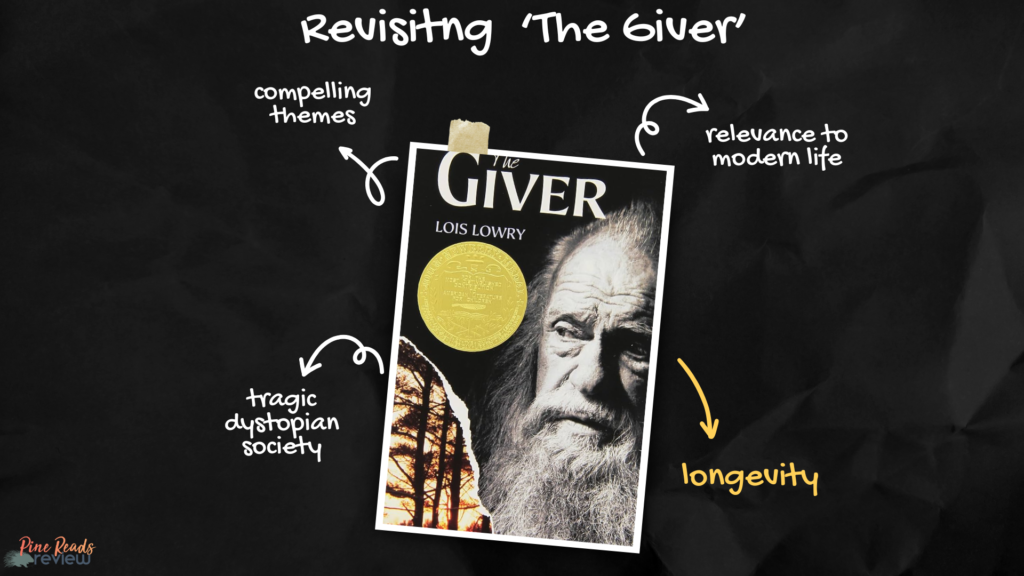
Jonas lives in a community where everything is predetermined. From a person’s childhood, profession, family unit, and even their release to Elsewhere as an elder, every aspect of life is assigned to them by a Committee of Elders that surveils everyone from birth. Here, “Sameness,” a sense of uniformity valued above all else, provides order. Without differences, conflict, and hardship, all those “archaic” emotions of grief, love, and pain fade to an echo, providing an idyllic environment for one to live life—as long as they obey the rules. However, unlike his friends, when Jonas turns twelve, he’s not assigned a role at the ceremony but selected. He’s chosen to be the new Receiver of Memory, the only person appointed to know the past before life in the community. With The Giver as his instructor, Jonas begins to question his passionless, secure life. When someone he loves is in danger, he realizes what it truly means to choose.
The balance between freedom and security, as well as individualism and community, are the driving themes of the book. On a surface level, the community’s “true” equality could be seen as well-intentioned. Ensuring each person has a partner, family, and work well suited to their personality could also be thoughtful. Yet, like any absolute government, Jonas’ community is frightening: the total control over lives, the monotony of everyone’s Sameness, the lack of a democratic process, and the killing of people deemed “useless.” Considering these circumstances, it’s hard not to sympathize with the young protagonist, especially when he does come to understand his society’s flaws for the first time. It makes us remember what we take for granted—like memory, pain, or pleasure. However, Jonas’ sensitivity, kindness, and inner courage to make his own choices help him change his world for the better. Rereading this story helped me see again how powerful and moving this choice can be.
I didn’t just read the book; I also rewatched the 2014 film adaptation of The Giver. One notable change is how they aged up the children to late teens. It gave the story more of a “new adult” feel than the “YA” of twelve-year-old Jonas, and I wasn’t a fan. More than that, while I enjoy the romance and dystopia combination in literature, the adaptation’s choice to make Jonas and Fiona’s platonic relationship “romantic” was more uncomfortable than satisfying. In the beginning, Book Jonas’ “stirrings” regarding Fiona convey a newly-born desire and innocent crush of a young boy growing up in a repressed society. It’s another catalyst for his coming-of-age, not the beginnings of a romance, and seeing the unnecessary romantic tension in the movie felt like a marketing device rather than an adaptive choice that supplemented the original (a story focused on familial and platonic love). Likewise, for a novel so compelling in its quiet contemplation and philosophically-heavy plot, the heightened drama and action added to the film, resembling other successful YA action-heavy dystopian stories at the time, felt like a disservice. The newly introduced chase scenes or antagonistic characters around Jonas (like his best friend Asher or the chief elder) clashed with the original’s subtler social critique. However, I can’t completely discredit the film. Its poignant musical score, scenes of vibrant color or monochrome, and skilled acting were absorbing.
While our history of totalitarian regimes and flawed governments is most apparent in its similarity to The Giver, we might also say that the act of choice is threatened in present times. I understand the fear that comes with free will or choosing wrong, but as seen in this story, there can be a dangerous complacency in letting someone, or something, choose for you. One example that comes to mind is letting Chat-GPT designate choices in your life. These days, some rely on this technology to decide things as simple as what to eat for dinner, how to talk to a friend, or what language to use on an assignment. While innovative technology isn’t inherently bad, it can be when it substitutes the necessary mistakes, emotions, and willpower that come with living life. There’s also a quality of “Sameness” in generative technology. It can never feel, have individuality, or go against its predestined “rules,” which reflects the empty lives in The Giver.
Ultimately, I encourage you to revisit these childhood books from back in the day and remember why they were so important and beloved. You might be surprised at the longevity of their themes. Since it was a pleasure to revisit this insightful story and see how much we can still relate to it today, I hope you reread it as well!
Danielle Hartshorn, Pine Reads Review Writer and Editor